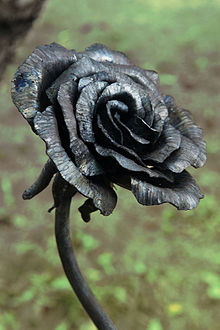Róisín Dubh (song)

"Róisín Dubh" (pronounced Ro-sheen dove or Ro-sheen doo, meaning "Black Rose"), written in the 16th century[citation needed], is one of Ireland's most famous political songs. It is based on an older love-lyric which referred to the poet's beloved rather than, as here, being a metaphor for Ireland. The intimate tone of the original carries over into the political song. It is often attributed to Antoine Ó Raifteiri, but almost certainly predates him.[1] Originally translated from the Irish language by James Clarence Mangan, this translation is credited to Pádraig Pearse.
The song is named after Róisín Dubh, probably one of the daughters of Aodh Mór Ó Néill, earl of Tyrone in the late 16th Century. The song is reputed to have originated in the camps of Aodh Rua Ó Domhnaill[citation needed].
Lyrics
This song is traditionally sung in the Irish language, with few if any recordings of the English existing. This song belongs to the 'aisling' or 'vision' songs of the 17th century.[citation needed] The reason behind the transposing of Ireland as a maiden was not merely poetic, but also avoided the English persecution of the time on songs about Ireland.[citation needed]
| Irish[2] | English |
|---|---|
|
A Róisín ná bíodh brón ort fé'r éirigh dhuit: Is fada an réim a léig mé léi ó inné 'dtí inniu, Mhairbh tú mé, a bhrídeach, is nárbh fhearrde dhuit, Shiubhalfainn féin an drúcht leat is fásaigh ghuirt, Dá mbeadh seisreach agam threabhfainn in aghaidh na gcnoc, Beidh an Éirne 'na tuiltibh tréana is réabfar cnoic, |
Little Rose, be not sad for all that hath behapped thee: Long the journey that I made with her from yesterday till today, Thou hast slain me, O my bride, and may it serve thee no whit, I would walk the dew with thee and the meadowy wastes, Had I a yoke of horses I would plough against the hills, The Erne shall rise in rude torrents, hills shall be rent, |
Renditions
Róisín Dubh has been frequently performed and recorded, both in its own native Irish and translated into English. (However, quality of the translations vary greatly, from strict to those bearing no relationship to the original Irish.) It has been sung by numerous Irish traditional singers including the late Joe Heaney and Maighread Ní Dhomhnaill, as well as in genres ranging from classical to rock and jazz.
The instrumental range is as wide as the vocal, but the instruments best suited to render this air authentically are the native Irish uilleann pipes, flute, fiddle, and whistle, as these are capable of making the "caoine" ("cry") – that is the note-shaping and changing that is characteristic of the native Irish music. However, other versions using different instruments are also widely available.
Musicians/composers who have performed or recorded the song include:
- Joe Heaney, famed Conamara Sean Nos singer
- Paddy Tunney- great folk singer and lilter from the county Fermanagh in Ulster
- Maighread Ní Dhomhnaill – native Irish singer from the famed Ó Domhnaill singing family of Rann na Feirste, Co. Donegal.
- Seán Ó Riada, whose score for the 1959 film Mise Éire was based on the melody
- Sinéad O'Connor
- The Dubliners. Instrumental, circa 1964. Also the song 'For what died the sons of Róisín'.
- Caitlín Maude on her 1975 album Caitlín
- Cherish the Ladies 1993
- Joanie Madden, leader of Cherish the Ladies, tin whistle instrumental on her solo album "Song of the Irish Whistle" (1997)
- Ann Mulqueen
- Thin Lizzy wrote the song "Black Rose" based on the story of Róisín Dubh. This song was covered by Northern Kings on their 2008 album Rethroned.
- Flogging Molly recorded the song "To Youth (My Sweet Róisín Dubh)" on the album Within a Mile of Home (2004)
- Black 47 recorded a song titled Black Rose for the album Home of the Brave
- Máire Ní Chathasaigh recorded an instrumental version for solo harp on her duo album with Chris Newman "Live in the Highlands" (1995)
